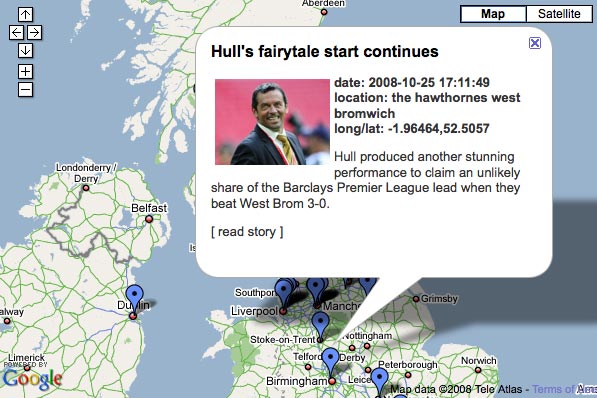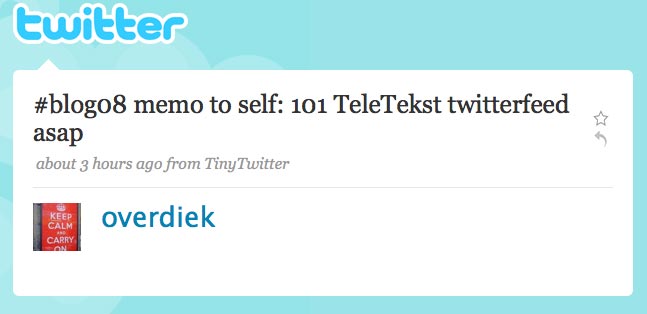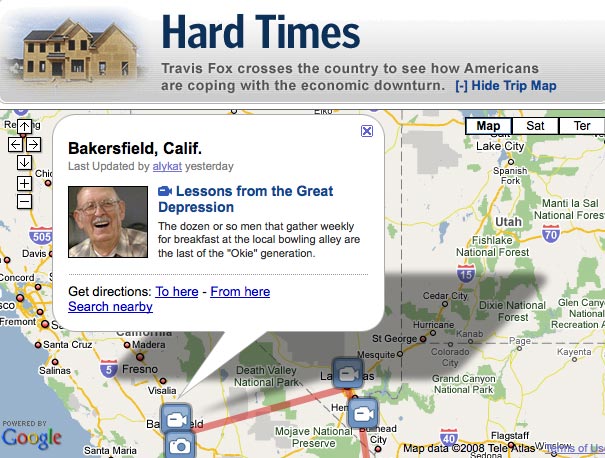BBC proposals to invest £68 million over five years in local, on-demand news video will ‘destroy’ commercial radio’s prospects online, said Mark Story, Bauer Radio managing director for national brands, at an industry conference yesterday.
Tag Archives: BBC
ITN maps news items with Google mash-up
British news company ITN has started to develop Google Maps to its advantage: a new mashed-up map of its news stories uses Google Gears Geolocation API to determine the user’s location and provide them with geographically relevant news.
The site provides a map with pinpoint flags highlighting the location that a particular news item is related to. All the user has to do is click on the individual flag and read on for the full story.

The reader can change the destination to view worldwide stories, while also being able to access archive stories stretching back to the previous month.
Website mibly.com has also used Google Maps, on this instance, working in conjunction with BBC iPlayer, tagging where a certain programme was located, allowing UK residents to view the selected show by clicking on a flag.
FT.com on Robert Peston: the characters shouldn’t get bigger than the brand
Well, although we’re not having a drink in the Long Room we did get to ask FT.com’s Rob Grimshaw about his views on the BBC’s Robert Peston (formerly of the FT). After all, the FT lept to the BBC’s economic editor’s defence last week.
What does Grimshaw, FT.com’s managing director, think of Peston-mania? Journalism.co.uk asked.
“Ah, the all powerful Robert Peston,” Grimshaw laughed. Individual and ‘big’ personalities are important, he said. “The characters matter. It’s not just about the FT brand – it’s about what these individuals think.
“But I don’t think they can ever be bigger than the brand,” he said. Although, ‘ultimately they are part of core FT message,’ he said.
You can listen to his comments here:
[audio:http://www.journalism.co.uk/sounds/FT4.mp3]Jeremy Dear responds to regional media/BBC Local row
Following coverage of last week’s comments by National Union of Journalists (NUJ) chief Jeremy Dear, about his bemusement with the regional press’ opposition to the BBC’s proposals to extend local video offerings online, the general secretary has responded, saying that there’s ‘room for everyone’ in the regional market.
“My point is that the local newspapers campaign is for their own vested interests – they don’t care about ensuring local people have a variety of sources of news, comment and entertainment. They want to be able to capture the market themselves. I fully support the newspapers’ expansion in to online media and I hope they capture a significant part of the audience – but it has to be done through quality content, with enough staff and resources to win ‘eyeballs’ not by stopping the licence fee payer being able to access BBC local services,” he writes in a blog post.
Dear adds that he has replied to a letter from Trinity Mirror’s director of corporate communications about his remarks, but is yet to receive a response:
“I simply asked him the question that if we believe in media plurality and we accept that commercial local TV and radio can exist alongside the BBC what is so different about online?”
Regional newspaper publishers have previously told Journalism.co.uk that ‘enough staff and resources to win “eyeballs”‘ would be a much easier prospect if a £68 million, five-year investment plan was available.
The final decision on the plans is fast approaching – it’s scheduled for February 25 2009 – and perhaps now is the time for the regional press to ask themselves what can be done if their opposition fails.
Is there potential for collaboration with the BBC online, and could this drive further innovation by regional titles online in response to the competition? Or will approval of the scheme lead to a reduction in online investment by the regional media?
BBC News: Nigerian news blogger detained by security services
Jonathan Elendu, who runs Nigerian news site Elendu Reports, was held without charge by the country’s State Security Service (SSS).
Blog08: Journalism versus hearth blogging
Not your average panel with Tim Overdiek, deputy editor in chief at NOS news; Clo Willaerts, marketing manager for Sanoma Magazines Belgium; Paul Bradshaw from the Online Journalism Blog; and Piet Bakker, professor at the Hogeschool Utrecht.
The journalism/blogging panel aims to answer questions gathered via de Nieuwe Reporter, one of the largest Dutch journalism blogs.
Tim Overdiek from NOS News shares that over a hundred NOS colleagues from a total of 400 have contributed to weblogs.nos.nl. Only forty employees are active bloggers but a hundred contributions in the form of either comments or blog posts is a certainly good number.
He remarks that professional journalists often don’t see bloggers as collaborators but as a form of contribution, as something they can use. There is no direct participation. The participating journalism that Dan Gillmor refers to is not happening in the Netherlands, according to Overdiek.
We’re currently moving beyond blogs, and the practice of blogging has gone beyond the medium of the blog and has partly and moved to Twitter for example. There is a whole world to gain for bloggers and also for organisations to actively set out to get people blogging.
It is interesting to note that during one of the previous sessions Tim Overdiek sent out a tweet to remind himself to create a 101 Teletekst Twitterfeed asap.

Teletekst is the Dutch equivalent of the BBC Ceefax and the 101 page is the standard page for news headlines. It is interesting to see how one of the most popular ways to keep up with the news is going to be syndicated on Twitter in the near future. The NOS is focusing on embracing the new social media and sees syndicating existing content on different platforms as the next step.
The question that was selected from the Nieuwe Reporter was a rather odd choice since there was a lot of discussion about the relevance and phrasing of the question in the comments (in Dutch). Unfortunately the question also eventually drived the discussion nowhere:
Imagine there would be a stock exchange for newspapers, broadcasters, magazines, weblogs, and other media. Which stocks would you buy when taking the next five years in account?
Tim Overdiek: Buy stocks in NOS, we have great outlets, we have different platforms such as mobile TV, blogging and Twitter. The NOS media department is pretty tech savvy. However, he advises not to bet on just one company because there are too many interesting things going on in different places.
Piet Bakker would buy stocks in magazines because the problem with blogging and internet is that to monetize it is quite difficult.
Paul Bradshaw would also buy stocks in magazines because all of the advertising on the internet pretty much goes to Google. Offline and online advertising are not on the same level yet and on top of that magazines have a lot of muscle. Bradshaw thinks that they will buy out successful blogs. Newspapers are also trying to be more like magazines which shows the bright future of magazines but they don’t see it quite yet. casinochan signup
Journalists should work with bloggers on a level playing field. He [Bradshaw] mentions the example of a newspaper that recently recruited 40 bloggers but it’s not a top down relationship with one main editor that makes all the decisions. He sees this as a good way forward because journalists and bloggers should treat each other like citizens.
Erik Huggers at last week’s MIP 2008 Conference
This comes from the distant past of last week, but this interview with Erik Huggers, (the man who should be at the forefront of everything technology at the BBC, given his job title) is worth a look and was flagged up on the BBC’s Internet blog yesterday.
Huggers is the BBC’s director of future media and technology and he spoke at last week’s MIP 2008 conference.
In his speech he looked at:
“The challenges facing broadcasters as the pace of change accelerates, and how they must evolve to ensure a consistent experience across all platforms – without compromising quality.”
In the interview below he talks to journalist Kate Bukley.
Erik Huggers, BBC: the MIPCOM 2008 interview from James Martin on Vimeo.
Looking at the Liverpool papers live blog coverage of the Rhys Jones murder trial
The Liverpool regional papers, the Liverpool Daily Post and Echo, continue their comprehensive coverage of the Rhys Jones murder trial using Cover It Live technology, which allows the reporter to feed back detailed information about what is happening in the courtroom.
The liveblog of the Rhys Jones trial is currently on standby, but should be going again at 14.30 today. The Rhys Jones coverage can also be viewed together on one page.
For ease of reading back through, it would be good to have the live court coverage more clearly marked with dates and days of trial in the left hand margin next to the times.
On October 9 the Liverpool Daily Post’s editor, Mark Thomas, asked for feedback, but it seems none has been offered.
It’s an impressive feat, which has been going since October 9, and brings up questions of modern day court reporting: it will be interesting to see if it enters the public panel discussion at this week’s POLIS debate at LSE. They’re debating ‘Respect for Contempt: Keeping Speech Free and Trials Fair’.
With a panel that includes Maxine Mawhinney from BBC News 24 as chair, and contributions from Joshua Rozenburg (Legal Affairs Editor, Daily Telegraph), Jonathan Kotler (US Attorney and USC Annenburg School of Journalism), Mark Haslam (partner, BCL Burton Copeland, and Nick Davies (Guardian, author of Flat Earth News), it should make for an interesting set of much-needed discussions.
Mapping: BBC reports live event with map tools; WaPo plots Travis Fox
Mapperz blog is claiming a BBC first, as the corporation used a series of mapping tools to cover today’s parade in London of Britain’s Beijing Olympics team.
The interactive map featured Twitter updates from BBC sport journalists Tom Fordyce and Ollie Williams and was capable of showing photos submitted by spectators (though it appears only one has been uploaded at time of writing).
It links to a Flickr group of images from the parade, live text updates on the BBC website and a full news and video report on the event.
Meanwhile, the Washington Post is plotting the progress of Travis Fox, as the video producer makes a journey across the states reporting on how the economic downturn is affecting citizens.
Fox’s route is shown with markers indicating video posts and photos, which are also included in his blog reports below the map.

‘Baldy Blogger’ Adrian Sudbury’s memorial to be streamed online
The memorial service for Adrian Sudbury, the Huddesrfield Examiner journalist who died from leukaemia in August, is being streamed live via the paper’s website with the help of the BBC.
Sudbury, who used his site Baldy’s Blog to lead a campaign to improve bone marrow donation education in UK schools and colleges, was 27 when he died.
“The memorial service will be attended by people who supported Sign Up For Sudders, as well as Adrian’s friends, family and colleagues.
“Also expected to attend are readers of Adrian’s award-winning online diary, Baldy’s Blog, where he chronicled the ups and downs of living with leukaemia.
“The service will feature a pre-prepared message from Adrian himself, video tributes from the media and colleagues, speeches from his family, friends and Colne Valley MP Kali Mountford, who helped with Adrian’s campaign,” according to a post on the site.